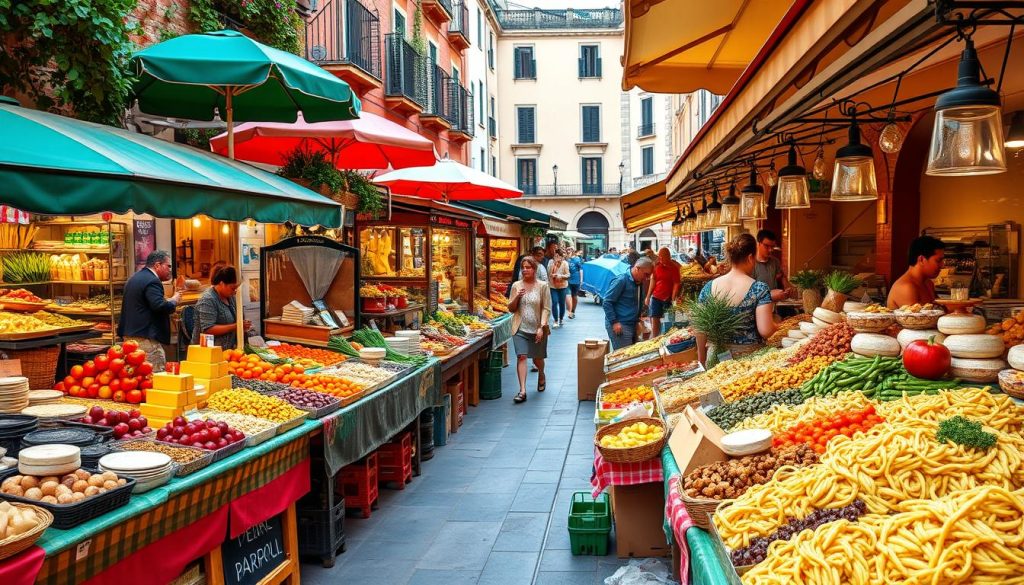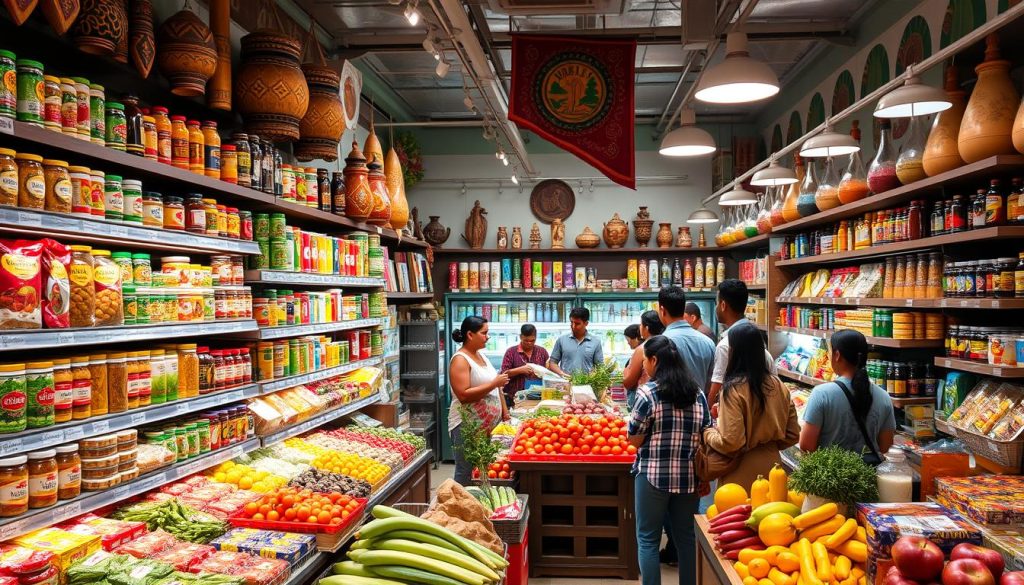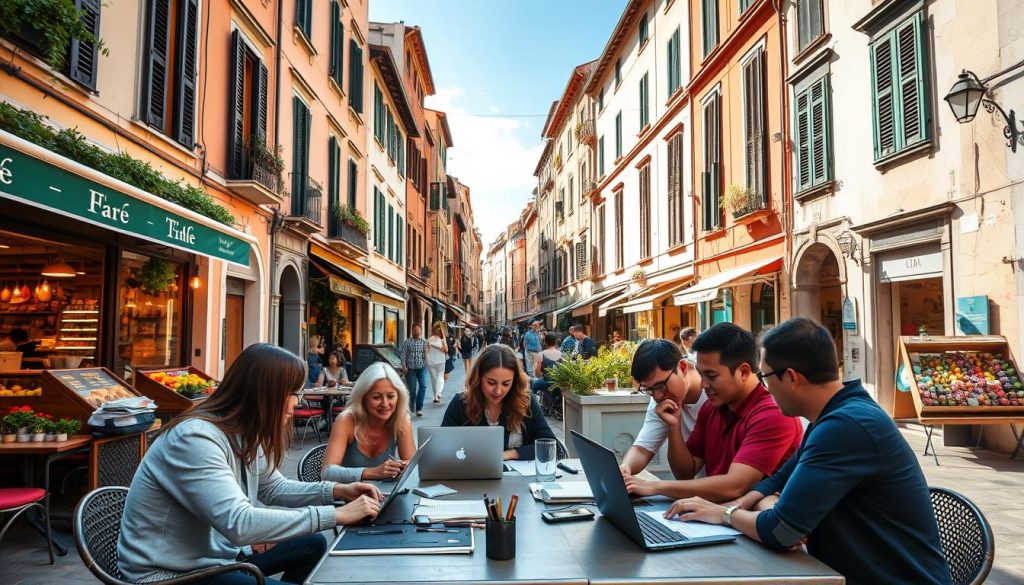Italy is a big player in Europe’s economy, ranking third. It’s also the eighth largest globally. This makes it a great place for entrepreneurs. With its rich culture, beautiful landscapes, and famous food, Italy offers many business opportunities for English speakers.
Fields like life sciences, tech, fashion, tourism, and luxury real estate are booming. These areas show Italy’s vibrant business scene. This makes it a great place for investors.
Starting a business in Italy might cost around €2,000. But, it can be done quickly, in just 5-6 days. This is especially true for foreign investors wanting to start a Limited Liability Company (SRL).
This article will look at the best business ideas for English speakers in Italy. We’ll also share tips for success in the Italian business world.
Key Takeaways
- Italy is a prime location for entrepreneurs, with various sectors ripe for investment.
- The country supports a thriving tourism and hospitality industry, presenting numerous business ideas in Italy.
- Language schools and cultural exchange centres offer opportunities tailored for English speakers.
- Italy has a tech-savvy consumer base, particularly suited for e-commerce ventures.
- Government incentives and favourable business practices encourage foreign investment.
- A well-crafted business plan is crucial for success in the competitive Italian market.
Overview of the Italian Market Opportunities

The Italian market offers many chances for entrepreneurs, thanks to a strong economy and a supportive government. Italy has a GDP of $2.17 trillion and a GDP per capita of $36,810 in 2022. The economy grew by 3.7% in 2022, but growth is expected to slow down in 2023 and 2024.
With 3.7 million SMEs, these businesses create 75% of jobs and one-third of GDP. This shows the Italy business climate is lively and open to new ideas.
Key sectors like tourism, hospitality, food and beverage, and e-commerce are booming. Italy attracts millions of visitors each year. The government also supports startups with programs like the Italy Startup Visa.
This visa focuses on high-tech products and requires a minimum investment of €50,000. It’s designed to attract innovative entrepreneurs to the Italian market.
The Italy business climate is also committed to rebuilding through the National Recovery and Resilience Plan. This plan allocates €191.6 billion in loans and grants by 2026. It’s crucial for opening new business opportunities, especially in technology and innovation.
Startups can find various financing options, which helps them succeed in Italy’s competitive market.
Exploring the Tourism and Hospitality Industry

The tourism and hospitality industry in Italy is crucial for the economy. It brings in a lot of money. In 2019, Italy welcomed over 94 million visitors, showing tourism is booming.
In 2023, tourism in Italy grew by 15%. This made Italy the second-fastest growing country in tourism after Germany. This growth means there’s a big demand for different types of hospitality investments. From boutique hotels to tour operators, there are many opportunities.
Types of Businesses in Tourism
There are many business chances in tourism. Investors can look into:
- Boutique hotels in famous places like Rome or Venice. These need an investment of €500,000 to €2 million.
- Starting a bed and breakfast in places like Tuscany, Umbria, or Sicily. This can cost between €50,000 to €100,000.
- Tour operators. Starting one in a big city can cost between €100,000 to €500,000.
- Cultural and culinary experiences. This is especially good since 22.3% of Italian tourists and 29.9% of foreign tourists love food and wine.
Investment Trends in Hospitality
The hospitality sector in Italy is diverse and growing. It created 25% of new jobs in 2023. Luxury travel is becoming more popular, adding 3% to Italy’s GDP. This shows a growing demand for top-notch experiences.
There’s also a big push for sustainable and eco-friendly tourism. Places like Abruzzo are leading in green tourism. With cultural interest on the rise, the sector is expected to reach $12 billion by 2028.
Food and Beverage Business Ideas in Italy

Italy’s food and drink sector is booming, attracting entrepreneurs. The country’s love for Italian cuisine, with its rich traditions and variety, is a big draw. Starting a traditional trattoria can be a great idea, appealing to both locals and tourists with authentic dishes.
Starting a Traditional Trattoria
Opening a trattoria lets you get creative with menus while using local ingredients. These places attract customers with unique dining experiences tied to Italy’s regions. The trend for real, home-cooked meals makes dining out even more appealing.
Opportunities in Wine and Gelato
The wine and gelato sectors in Italy are full of potential, thanks to the country’s strong farming background. Italy is a big player in renewable energy, showing its dedication to sustainable wine-making, including organic vineyards. The gelato market is expected to grow to $135.6 billion by 2029, offering a chance for entrepreneurs to shine. You can explore unique gelato flavours, meeting the demand for quality and creativity.
Fashion and Design: A Leading Sector in Italy

The fashion industry in Italy is famous worldwide. It offers many design chances for new entrepreneurs. Cities like Milan and Florence are perfect for starting fashion brands, thanks to their rich history.
Italy’s complex supply chain and skilled artisans help brands focus on quality and creativity. It’s important to keep up with trends and market changes. These can be influenced by seasons, what people buy, and global events.
Launching Your Own Fashion Label
Starting a fashion label in Italy needs careful planning. First, do market research to understand what your customers want. Creating customer profiles helps design clothes that appeal to different groups.
It’s also important to know what your competitors are doing and find gaps in the market. Use both surveys and talking to people in the fashion world to get a full picture.
With more people shopping online, think about the costs. Opening a clothing shop can cost at least 50,000 euros, depending on where and how big it is. Choosing the right place is key, finding a spot that’s easy to find but also affordable.
What you sell first is also crucial. You need to show off your brand’s style with your first products. Decorating your shop should match your brand, and you can even get creative with DIY projects.
Business Ideas in Italy for English Speakers

English speakers in Italy have many business ideas to explore. These ideas tap into the local culture and community. For example, La Grande Quercia Gelateria in Florence, started by Miguel, shows how to succeed by adding cultural touches to your business. Café Arabesque in Rome, owned by Hassan, is another example of how food businesses can draw in both locals and tourists.
The Italian market is full of opportunities for different types of businesses. Danza del Sole in Milan, founded by Maria, is a dance studio that attracts expats and tourists. Shops like the Korean Beauty Boutique in Turin and the Jamaican Jerk Hut in Naples also show how unique products can thrive in Italy.
Entering the education sector is also promising. Scuola di Lingue Easy Languages in Milan offers language courses for everyone. With 99.9% of businesses being small or medium enterprises, there’s a lot of room for growth.
Italy’s tourism, with over 60 million visitors a year, creates a big market for unique experiences. Companies like Discover Italia Tours and Taste of Napoli Tours meet this demand with their special tours. The international community in Italy encourages teamwork and innovation, making it a great place for new businesses.
To succeed, you need to be flexible and patient, as 89% of entrepreneurs say. Building relationships and understanding local customs are key, with 73% of business owners agreeing. With the right mindset, English speakers can find many opportunities in Italy.
The Italian Startup Ecosystem

The Italian startup scene is growing fast, thanks to government help. Programmes like the Italia Startup Visa make Italy a great place for new businesses. In 2019, 481 people applied, but only 250 got in by January 2020.
This visa needs a EUR 50,000 investment for teams. Startups can stay for up to five years, showing the government’s support.
Government Support for Entrepreneurs
The Italian government is really helping startups. CDP Venture Capital started in 2020 to support local businesses. The Italian Startup Act gives tax breaks and a strong visa for foreign talent.
By October 2022, Italy had 14,708 innovative startups, up 0.6% from before.
Networking Opportunities in Major Cities
Networking is key in Italy for startups. Cities like Milan and Rome are great for meeting investors and partners. The local community is important for sharing ideas and helping each other.
Business coaching also helps a lot. It helps startups deal with red tape and grow in different markets.
Engaging in E-commerce Ventures

E-commerce in Italy is growing fast, offering many chances for entrepreneurs. Digital shopping helps businesses reach more customers than before. It’s key to know the market and what customers want to succeed.
Online Marketplace Opportunities
More Italians are shopping online, creating new chances for businesses. Setting up a site for local artisans can meet the demand for unique items. This trend also supports eco-friendly and local products.
Starting a business is risky, with 50% failing in five years in Europe. But, focusing on special areas like handmade goods or local foods could be a good move.
Finding Your Niche in E-commerce
Finding a specific area in e-commerce is crucial for success. For example, eco-friendly baby products are in high demand. Other good ideas include collectibles, local food, and handmade toys.
Businesses need to use digital marketing to draw in and keep customers. They should be ready to change their approach as customer tastes shift. E-commerce in Italy is a lively field for new businesses to grow.
Renewable Energy Business Prospects

Italy is leading the way in renewable energy, changing the energy scene. In 2022, Italy used 4.5% less energy than the year before. This is a big drop, showing a move towards green energy.
Renewables now make up 18.5% of Italy’s energy mix. This is a big step towards a cleaner future.
Investing in Solar and Wind Energy
The Italian government wants renewables to make up 40% of energy by 2030. They’ve set aside €59 billion for green projects from 2021 to 2026. Companies like Mott MacDonald are growing their teams in Italy for renewable energy jobs.
They’re looking for Renewable Energy Engineers and Project Managers. This shows the demand for green energy skills.
The European market is huge, with over 40 countries and a big population. Italy’s push for solar and wind energy fits into Europe’s goals. It’s a great chance for businesses to get into sustainable energy.
Creating Cultural Exchange Centres

Cultural exchange centres in Italy are key to enriching communities. They offer events, classes, and activities that celebrate different cultures. These centres attract locals, tourists, and expatriates, helping them understand and appreciate various traditions. It’s crucial to have a good business model for these centres to thrive.
Such centres can make money in several ways:
- Membership fees
- Event ticket sales
- Partnerships with local businesses and organisations
Italy’s economy is looking up, with a GDP growth of about 2.5% expected in 2023. This is great news for new businesses. The growth in Italy’s wholesale and retail trade sector also matches the demand for cultural services.
By offering diverse programs like workshops, performances, and culinary events, cultural centres become more appealing. They help different cultural groups interact, strengthening the community. At the same time, they offer economic opportunities.
Establishing Language Schools in Italy

The landscape for language education in Italy is booming. It offers many chances for entrepreneurs to start a language school. The global language learning market made US$52 billion in 2022. It’s expected to hit US$155.2 billion by 2028, growing at 20% annually.
Tourism and an increasing number of expats are driving the demand for language courses. They want to learn Italian and other languages.
Market Demand for Language Education
There are XXX language schools in Italy offering English courses. They are spread across various cities, meeting the growing need for language education. British Institutes have a strong presence in XX cities, making them a leading language school franchise.
Spending on education courses has increased by.*% over the years. This shows a strong market potential for new language schools.
Strategies for Success in Language Schools
To thrive, focus on tailored programmes for different groups. This includes tourists and expats. Working with local schools can boost credibility and reach.
Successful schools mix traditional classrooms with online learning. This caters to different learning styles. Using adaptive learning and offering various courses can boost student numbers and keep them coming back.
Opportunities in Import/Export Businesses

Italy’s location in Europe offers great chances for those in the import export business. The demand for different products worldwide is high. This is especially true for fashion, food, and handmade items. Knowing what products are in demand is key to starting a business.
Identifying Top Export Products
Italy is famous for its high-quality goods. The top export areas include:
- Fashion and Accessories: These items are always in demand for their style and trends, especially from Italy.
- Food Products: Italian food, like spices and condiments, is vital in the global food market. It offers a chance to bring exotic flavours to the world.
- Gems and Jewellery: This luxury market offers unique pieces that meet international tastes.
- Footwear: Italy’s shoes are known for their quality. Trading shoes can link different styles around the globe.
- Pharmaceuticals: Trading medicines helps meet global health needs, improving health worldwide.
- Automotive Parts: There’s a steady need for car parts and accessories, making this a profitable area.
With over 1.3 billion trade data points from Tendata, the market is promising and well-documented. Italian spices are also becoming popular, matching the global trend for healthy and organic foods. This shows the need for a wide range of products in Italy’s import export business
To succeed, entrepreneurs need to build strong relationships with suppliers. They must also understand and follow all rules and regulations. Knowing the local and global markets well can help make a business in this sector very profitable.
Starting Ethnic Grocery Stores

Ethnic grocery stores are becoming a big part of Italy’s food scene. They offer unique products for locals, tourists, and food lovers. Finding the right location is key to success. Places with lots of people, like near universities or cultural spots, are great for these stores.
These stores can really show off the community’s culture by selling special ingredients and snacks. They can offer both local and imported goods. This way, they meet the varied tastes and needs of their customers.
Hosting cooking classes or cultural events can help build a loyal customer base. These activities make the store a welcoming place. They also help strengthen community bonds. As more people look for unique food experiences, these stores can make a lot of money.
To run a successful ethnic grocery store, you need to know what people want. Look into the local area to see what products to sell. This way, your store can stand out and become a favourite in the community. It shows how Italy values cultural diversity.
Personalised Travel Services as a Business Model

Personalised travel in Italy is a great chance for entrepreneurs. They can create unique itineraries that match what each client wants. This makes the visitor experience better and sets the service apart from others.
Starting a tour company needs careful planning. It’s important to invest time and effort wisely. First, check the local rules, like health and safety laws in Italy.
Finding the right market is key. With limited resources, focusing on a specific group can lead to better results. Choose a niche based on shared interests, trends, or gaps in the market. Create a strong value proposition that shows how your service meets customer needs.
Having a Unique Selling Point (USP) helps stand out from competitors. A good go-to-market strategy can reach your audience without breaking the bank. Set prices that show the value of your service while keeping revenue up.
Plan your budget carefully, including equipment, staff, and office space. Visualise daily operations to spot any service gaps. Having a list of contacts can boost your chances of success.
Financial planning means estimating costs and monthly expenses. Test your tour’s success before investing fully to avoid risks.
Choose a name that shows what makes your service special. Today, 62% of travellers want easy booking options. They also value luxury, personal experiences, and eco-friendly choices.
In summary, personalised travel services are a promising business model. They meet the growing demand for premium, sustainable experiences in tourism.
Launching Tour Guide Services

Starting a tour guide business in Italy is a great chance to meet the growing need for real cultural experiences. This trend is on the rise, especially with more family travel adventures among older generations. You can stand out by offering unique tours, like food tours or history walks, that attract specific groups.
Creating Unique and Engaging Experiences
To succeed in the tour guide business, you must create unforgettable experiences. Today’s travellers are inspired by movies and TV shows, which can spark new tour ideas. Working with local businesses can make your tours more authentic and open up chances for promotion.
It’s important to know the legal steps to start a guide service. This includes choosing how to register and possibly taking licensing courses. Creating a solid business plan is also key. It should include financial forecasts for the first five years to set a fair price based on costs and market trends.
Using technology is crucial. An online booking system makes booking easier and improves the customer experience, whether online or offline. Analyzing your competitors can help you find your unique spot in the market.
Utilising Digital Marketing for Italian Ventures

Digital marketing is key to success in Italy. Entrepreneurs need to use online promotion strategies to stand out. Italy’s focus on digital innovation makes digital marketing even more important. The rise in online shopping and work during COVID-19 has made these strategies crucial.
A strong online presence helps businesses reach their audience. It also uses data analytics for better decisions.
Effective Strategies for Online Promotion
Strong online strategies are essential in Italy’s market. Here are ways to improve online presence:
- Optimising website content with SEO to improve visibility in search engines.
- Utilising targeted advertising campaigns to attract specific demographics.
- Engaging with customers through personalised email marketing initiatives.
- Seeking collaborations with influencers to amplify brand awareness.
Social media is vital for entrepreneurs to connect with their audience. Platforms like Instagram, Facebook, and LinkedIn help showcase products and engage with customers.
Social Media’s Role in Business Growth
Social media boosts customer interaction and loyalty. It combines engaging content with direct communication. For example, 60% of online shoppers in Italy look for premium products.
By showing authenticity and quality, businesses can attract these customers. Seasonal promotions can increase sales by up to 40%, making online campaigns vital for growth
Conclusion and Next Steps for Entrepreneurs
Italy is a lively place for starting a business, full of chances for those who want to invest. It combines its rich culture with new ideas, making it easy to find unique business ideas. Knowing the market and using local resources is key to doing well here.
For those starting out, the first steps are to do your homework and find good partners. Working with the local community and using government help can help a lot. Also, having a solid business plan is vital, as 45% of young business owners say it’s crucial for success.
Entrepreneurs need to focus on quality and be ready to change with the market. With hard work and creativity, success in Italy is within reach. By following these tips and getting to know the local business scene, English-speaking entrepreneurs can thrive in Italy.
















